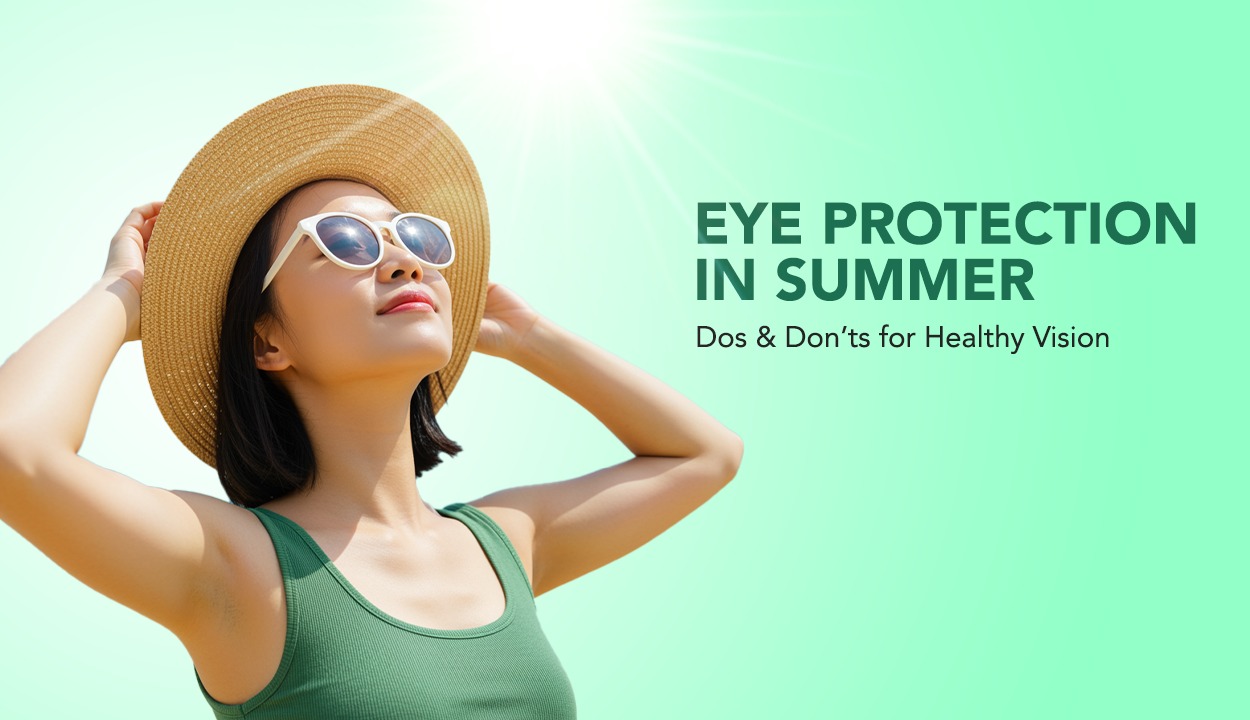
Eye Protection in Summer: Do’s & Don’ts for Healthy Vision
With summer comes sunshine, vacations and, unfortunately, increased risk to your eyes. Prolonged sun exposure, high temperatures, dry winds, and increased pollutants in the air can lead to a range of eye conditions that many overlook.
From minor irritations to long-term complications, the effects of UV rays and heat on the eyes are very real. Just like your skin, your eyes need proactive care and protection. This blog outlines the essential summer eye care tips for safeguarding your eyes during summer, with insights backed by medical science.
Why is Eye Protection in Summer so Important?
Our eyes are highly sensitive, and particularly vulnerable to the ultraviolet (UV) radiation. It is scientifically proved that exposure to UV rays and eye damage go hand in hand and can cause eye health concerns like photo keratitis, cataracts, macular degeneration, dry eyes and conjunctivitis.
Hence, recognising the relationship between UV rays and eye damage is important, mandating prioritising proactive eye protection in summer.
Do’s: Essential Summer Eye Care Tips
- Wear Sunglasses with UV Protection
- Choose lenses that offer 100% protection to your eyes from UVA and UVB rays.
- Ensure the frames are contoured and fit close to your face to block UV rays from entering through the sides. If the frame front is flat, opt for styles with wide temple arms to enhance side protection.
- The lens tint should be dark enough to reduce glare but should not affect visibility in normal lighting. Colour tints should not distort the colour perception- especially important when you’re behind the wheel or outdoors.
- To reduce horizontal glare for activities like driving or boating; always choose polarized lenses.
- Stay Hydrated to Prevent Dry Eyes
Dehydration is a common but overlooked cause of dry eyes in summer. When your body is not well-hydrated, tear production drops, leading to eye irritation, itching, and even a burning sensation.
Hence, drink 8 to 10 glasses of water every day and increase the intake during peak heat hours or when outdoors.
- Use Lubricating Eye Drops if Needed
Dry indoor air, especially from fans or air-conditioners, can cause dry eyes in summer. Artificial tears or lubricating drops can help maintain moisture and soothe irritation.
If you wear contact lenses, consult your ophthalmologist for suitable eye drop options that won’t interfere with your lenses.
- Eat a Diet Rich in Eye-Friendly Nutrients
Nutrients such as vitamin A, vitamin C, vitamin E, lutein, zeaxanthin, and omega-3 fatty acids help in maintaining good retinal health and protecting against light-induced oxidative damage.
Include seasonal fruits like oranges, mangoes, and berries, along with green leafy vegetables, almonds, flaxseeds, and oily fish.
- Maintain Hygiene Around the Eyes
Increased perspiration, dust, and allergens during summer can lead to a spike in infections like conjunctivitis and styes. Wash your face regularly, avoid touching your eyes without washing hands, and always remove eye makeup before bedtime.
Don’ts: Common Mistakes That Can Harm Your Eyes in Summer
- Don’t Step Out Without Eye Protection
UV exposure and eye damage is real and even short exposure to sunlight can be harmful if your eyes are unprotected. The cumulative effect of UV exposure builds up over time and can lead to irreversible eye damage.
- Don’t Rub Your Eyes
During summer, dust, sweat, and allergens in the air can make your eyes feel itchy or irritated. Rubbing them can cause micro-scratches on the cornea, worsen existing allergies, or introduce bacteria that may lead to infections like conjunctivitis.
If your eyes feel uncomfortable, rinse them gently with clean water or use prescribed lubricating eye drops. Persistent irritation should be evaluated by an eye specialist.
- Don’t Share Eye Products or Towels
In the summer heat, microbial growth multiplies rapidly. Sharing personal items like towels, makeup brushes, eye drops, or sunglasses can increase the risk of spreading eye infections.
- Don’t Ignore Certain Eye-Concerns
Persistent issues like redness in the eyes, sensitivity to light, continuous watering, or blurry vision require medical attention, as these may be early signs of serious eye-conditions like uveitis or keratitis. If any of these symptoms last longer than 24 hours, seek medical attention promptly.
Eye Protection in Summer Must be Taken Seriously
Your eyes are exposed to various summer-specific threats—UV radiation, heat, pollution, and dryness. By following these basic yet powerful summer eye care tips, you can maintain clear, comfortable vision through the season.
At Yashoda Kaushambi, our team of ophthalmologists provides expert guidance, diagnosis, and treatment for all kinds of eye-related concerns. Whether you’re experiencing dry eyes in summer, looking for summer eye care tips, or managing a chronic eye condition, we’re here to help.
For an appointment, click here – visit http://www.yashodahospital.org/

